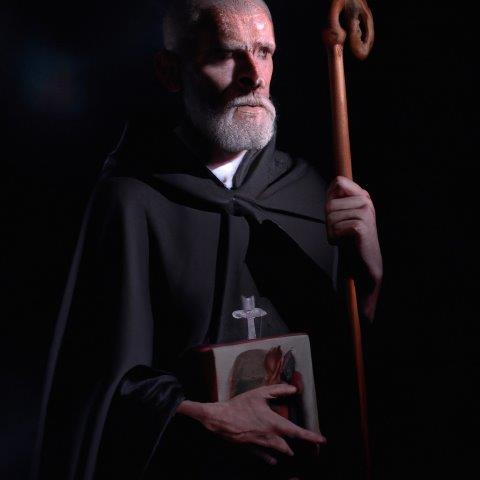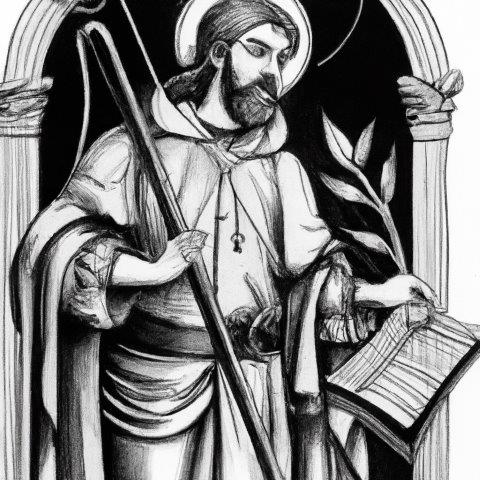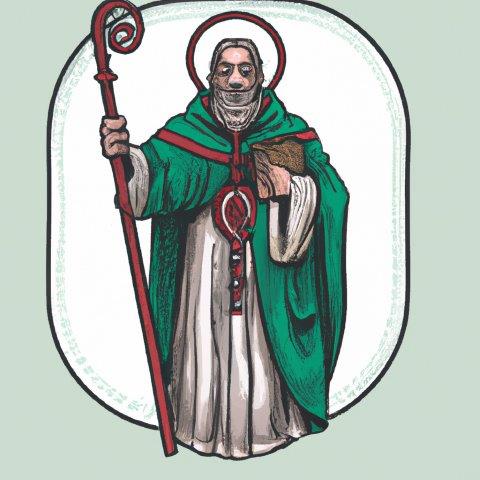Saints
St. Richard of Chichester
St. Richard of Chichester lived from 1197 to 1253 and his feast day is April 3rd. Saint Richard of Chichester was born in England and was a layman until he was forty-four. St. Richard, like St. Hugh of Lincoln, faced staunch opposition of English Kings but fought tirelessly for the Catholic Church.
The Holy Life of St. Richard of Chichester
St. Richard is the name of several saints in the Catholic Church, one of the most well-known is St. Richard of Chichester also known as Richard de Wych. He was an English bishop, a confessor, and a major medieval saint. He is remembered for his kindness, humility and for being a model of holiness for the people of his time.
Richard of Chichester was born in Sussex, England in the early 13th century. He studied at Oxford University and later at the University of Paris. After completing his studies, he became a teacher at the University of Paris. He then returned to England, where he was appointed as a canon at Chichester Cathedral.
In 1244, Richard was elected bishop of Chichester, despite some resistance from the cathedral chapter. He took up his duties as bishop and worked tirelessly for the spiritual and material well-being of his diocese. He was particularly known for his care of the poor and for his efforts to promote the education of the clergy. He also built a hospital for the poor and infirm, which was named after him.
Richard was also a strong advocate for the rights of the Church. He was one of the few bishops who remained faithful to the Pope during the crisis of the 1260s, when King Henry III of England attempted to exert control over the Church. Despite his loyalty to the Pope, Richard remained on good terms with the king and was able to use his influence to mediate disputes between the Church and the crown.
Richard’s reputation for holiness spread quickly, and he became known as a saint while he was still alive. He was venerated by the people of Chichester and the surrounding areas, and many miracles were attributed to him. He was particularly known for his kindness and humility, which endeared him to the people of his diocese.
After his death in 1253, Richard’s remains were placed in Chichester Cathedral and people soon started to make pilgrimage to his tomb. His cult of veneration was confirmed by the Pope in 1262, and his feast day is celebrated on April 3rd. He was canonized by Pope John XXII in 1301.
St. Richard is considered a model of holiness, kindness, humility and devotion to the Church. His tomb at Chichester Cathedral remained an object of pilgrimage throughout the Middle Ages, and it was considered as one of the most popular pilgrimage destinations in medieval England. Many churches, schools, and charities were named after him.
His teachings and example of charity and selflessness is still remembered and St. Richard of Chichester is invoked as the patron saint of Sussex and for people who are struggling for spiritual guidance, his teachings and example of charity and selflessness continues to be an inspiration for many people.
The Life of St. Richard
 Richard was the younger of two sons born to the middle class owner of the Manor of Wyche, about four miles from Worcester in England. The father died when Richard was young and the management of the estate fell to the older brother. He proved to be a poor manager and before long the estate was in deplorable condition. Richard was invited to take over, and he restored the family fortunes through his hard work and wise management.
Richard was the younger of two sons born to the middle class owner of the Manor of Wyche, about four miles from Worcester in England. The father died when Richard was young and the management of the estate fell to the older brother. He proved to be a poor manager and before long the estate was in deplorable condition. Richard was invited to take over, and he restored the family fortunes through his hard work and wise management.
After that, he returned the management to his brother and spent a number of years studying at Oxford and on the continent. He became a professor of law at Oxford and then Chancellor of the University. St. Edmund, Archbishop of Canterbury, made Richard his legal adviser and then chancellor of the Archdiocese. Edmund had stoutly defended the rights of the Church against the encroachments of King Henry III and had aroused the king’s anger.
St. Richard is named Bishop of Chichester
In 1240, Edmund decided that he should leave the country. He took up residence in a Cistercian abbey in Burgundy, now a part of France. Richard accompanied the archbishop into exile. Within a year Edmund died. After Edmund’s death Richard retired to a Dominican monastery in Orleans, studied theology, and was ordained a priest. He returned to England, hoping to be assigned a parish somewhere in the archdiocese of Canterbury. But Archbishop Boniface, who had succeeded Edmund as archbishop of Canterbury, ordered him to resume his post as chancellor.
In 1244, the Bishop of Chichester died. The canons of the cathedral, in order to please Henry III who was bent on controlling the Church and its revenues, recommended a court favorite for the see.
But Archbishop Boniface named Richard de Wyche to the post. The enraged king then seized all the property that belonged to the diocese. Richard and the king laid their cases before Pope Innocent IV who was then in Lyons. The pope decided in favor of Richard and consecrated him. But the king kept the property, and Richard did not have even a home of his own.
The Bishop of Chichester lived like a beggar, dependent on the hospitality of such priests as dared to befriend him. After two years the king, threatened with excommunication, returned the property, with the revenues greatly reduced, to the diocese. In person Richard visited the sick, buried the dead, and relieved the needs of the poor.
St. Richard of Chichester’s Humble Life of Service
When his steward complained that his gifts were greater than his income he said: “Sell the gold and silver plate and my horse to make up the difference.” He refused to curtail bi charity even after suffering a great loss from a fire. He ordered that the alms should be more abundant than usual. “Perhaps God has sent this loss to punish us for our covetousness,” he said. Richard was a true shepherd to his people. People liked the eloquence of his sermons, and they were attracted by an example that was more eloquent than words. He received penitent sinners with great kindness but was stern with those whose bad example had led others astray.
The pope asked Richard to arouse the enthusiasm of the English people for another Crusade. He preached the Crusade first in his own diocese and then in the archdiocese of Canterbury. While engaged in this work he fell ill and was taken to a hospital in Dover. He foretold his own death, which took place April 3, 1253. Richard’s body was taken Chichester and interred in his cathedral before the altar which he had consecrated to the memory of his friend, St. Edmund. Immediately, miracles began to take place at the tomb. Nine years after his death Richard was canonized by Pope Urban IV. Richard’s tomb was a favorite place of pilgrimage until it was destroyed in the time of Henry VIII.
OTHER SAINTS NAMED HUGH:
St. Hugh of Cluny, 10241109 Adviser to popes and sovereigns. Feast Day: April 29.
St. Hugh of Grenoble, 10531131 Austere Bishop of Grenoble. Feast Day: April 1.
St. Hugh of Montaigu, died about 1136. Abbot and later Bishop of St. Germain in Auxerre. Feast Day: August 10.
OTHER SAINTS NAMED RICHARD:
St. Richard, died about 772. King of West Saxons. Feast Day: February 7.
St. Richard of Andria, twelfth century. Native of England who became Bishop of Andria in southern Italy. Feast Day: June 9.
Popular St. Richard Medal and St. Richard Rosary
Patron Saints - R's
Prayer to St. Richard
St. Richard,
You were a man of great compassion, always willing to reach out to those in need and offer your assistance. I ask for your intercession as I seek to be a person of generosity and kindness, always looking for ways to help those in need.
May your example inspire me to be a person of charitable spirit, loving service, and compassionate action.
Amen.
Prayer to St. Richard
Dear St. Richard,
You were a man of deep faith, always seeking to deepen your relationship with God and to grow in your spiritual life. I ask for your intercession as I seek to deepen my own faith and to grow closer to God.
May your example inspire me to be a person of prayerful devotion, spiritual growth, and faith-filled living.
Amen.
Prayer to St. Richard
O St. Richard,
You were a man of courage and conviction, always standing firm in your faith and facing adversity with strength and determination. Help me to be like you, seeking to live a life of unwavering faith, and to be a person of steadfast courage and unwavering commitment to the Lord.
May your example inspire me to be a person of spiritual bravery, faith-filled courage, and fearless determination.
Amen.
St. Richard: Patron Saint of the Sick, Lepers, and Travelers
 St. Richard, also known as Richard of Chichester, was a 13th-century bishop who is venerated as a saint by the Catholic Church. He is considered the patron saint of the sick, lepers, and travelers.
St. Richard, also known as Richard of Chichester, was a 13th-century bishop who is venerated as a saint by the Catholic Church. He is considered the patron saint of the sick, lepers, and travelers.
St. Richard was known for his charity and his devotion to the poor, as well as his miracles of healing. He was said to have cured a leper by laying his hands on him, which earned him a reputation as a healer of the sick and of those with leprosy. This led to his being invoked as the patron saint of the sick and of lepers.
St. Richard is also considered the patron saint of travelers, due to a tradition that he once prayed for the safe passage of travelers and that his prayer was answered by the appearance of angels who guided the travelers to their destination. This story has made him a popular patron saint among those who travel, who seek his intercession for protection and guidance on their journeys.
In addition to these devotions, St. Richard is also remembered for his writings and his contributions to the Church. He wrote several treatises and sermons, and he was known for his preaching and his spiritual guidance. He is remembered as a wise and compassionate spiritual leader, and as a model of holiness and devotion.
In conclusion, St. Richard is venerated as a saint by the Catholic Church and is considered the patron saint of the sick, lepers, and travelers. He is remembered for his charity and his miracles of healing, as well as for his writings and his contributions to the Church. His intercession is sought by those in need of healing, guidance, and protection, and he is remembered as a model of holiness and devotion.
Reflection on the feast day of St. Richard
 St. Richard is the name of several saints, and the feast day of St. Richard depends on the specific saint.
St. Richard is the name of several saints, and the feast day of St. Richard depends on the specific saint.
In case you were referring to St. Richard of Chichester, his feast day is April 3rd, but I will provide a general homily reflection for a saint named Richard:
On the feast day of St. Richard, we remember and honor the life of a man who dedicated himself to serving God and spreading the word of Christianity. He was a bishop or a priest, who is believed to have lived a life of holiness and devotion. He is often remembered for his wisdom, humility and his charitable works.
St. Richard’s life serves as a powerful reminder of the importance of humility. He was known for his modest and humble ways, and he never sought fame or recognition for his good deeds. This is a powerful reminder that true greatness lies in humility and service to others.
St. Richard was also known for his wisdom, which he used to guide and mentor those around him. He was a true spiritual leader, who helped others to deepen their faith and their relationship with God. This is a reminder that we are all called to be wise, and to use our wisdom to help others.
St. Richard’s devotion to God and his love for others is an inspiration for us to be more charitable, kind and selfless. His life is a powerful reminder that we are called to a greater purpose and that our actions do matter. His legacy is a call to us to be more compassionate and to love others as we love ourselves.
As we celebrate the feast day of St. Richard, let us remember his legacy and strive to emulate his example of humility, wisdom, and charity. By following in his footsteps, we can make a positive impact on the world and bring a little bit of light and love into the lives of those around us.
Discover biographies, prayers, and reflections for more than 400 Catholic Saints


